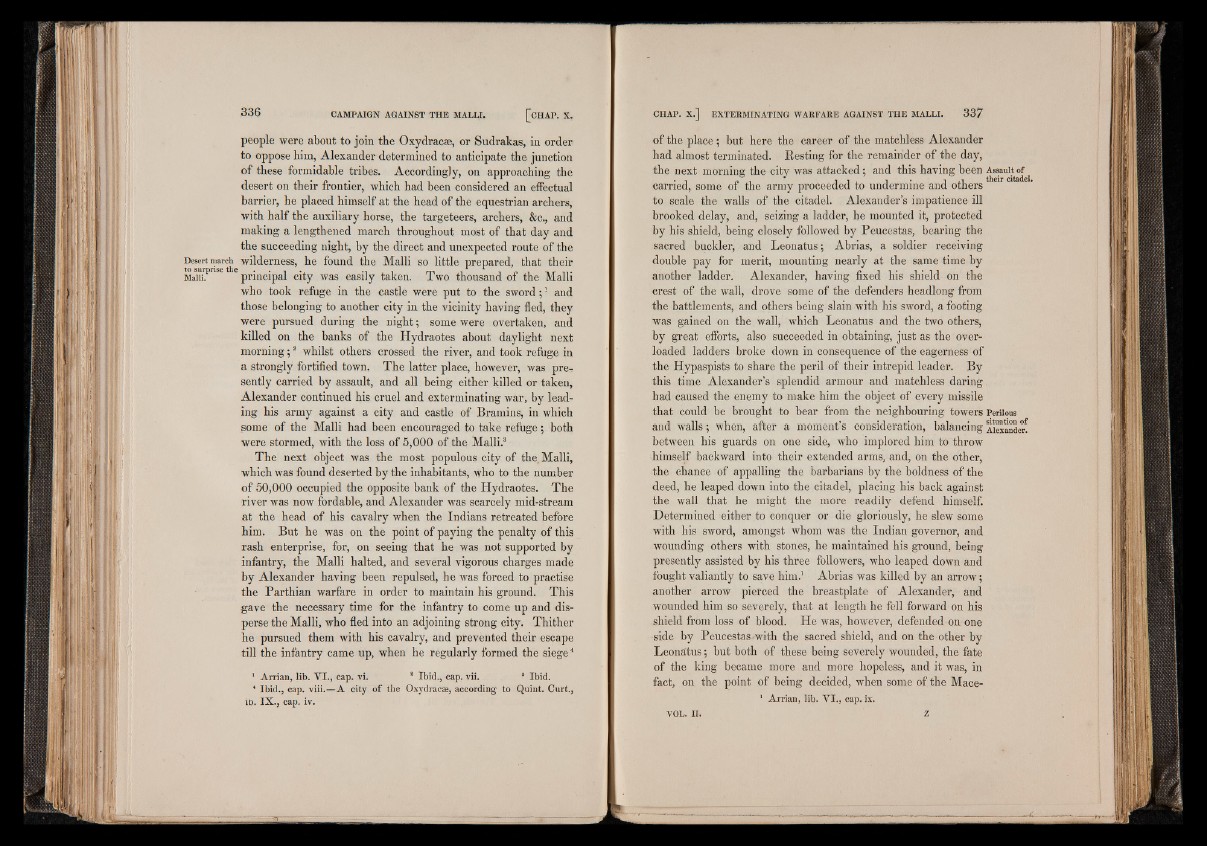
Desert march
to surprise the
Malli.
people were about to join the Oxydracse, or Sudrakas, in order
to oppose him, Alexander determined to anticipate the junction
of these formidable tribes. Accordingly, on approaching the
desert on their frontier, which had been considered an effectual
barrier, he placed himself at the head of the equestrian archers,
with half the auxiliary horse, the targeteers, archers, &c., and
making a lengthened march throughout most of that day and
the succeeding night, by the direct and unexpected route of the
wilderness, he found the Malli so little prepared, that their
principal city was easily taken. Two thousand of the Malli
who took refuge in the castle were put to the sword; 1 and
those belonging to another city in the vicinity having fled, they
were pursued during the night; some were overtaken, and
killed on the banks of the Hydraotes about daylight next
morning; 2 whilst others crossed the river, and took refuge in
a strongly fortified town. The latter place, however, was presently
carried by assault, and all being either killed or taken,
Alexander continued his cruel and exterminating war, by leading
his army against a city and castle of Bramins, in which
some of the Malli had been encouraged to take refuge; both
were stormed, with the loss of 5,000 of the Malli.3
The next object was the most populous city of the Malli,
which was found deserted by the inhabitants, who to the number
of 50,000 occupied the opposite bank of the Hydraotes. The
river was now fordable, and Alexander was scarcely mid-stream
at the head of his cavalry when the Indians retreated before
him. But he was on the point of paying the penalty of this
rash enterprise, for, on seeing that he was not supported by
infantry, the Malli halted, and several vigorous charges made
by Alexander having been repulsed, he was forced to practise
the Parthian warfare in order to maintain his ground. This
gave the necessary time for the infantry to come up and disperse
the Malli, who fled into an adjoining strong city. Thither
he pursued them with his cavalry, and prevented their escape
till the infantry came up, when he regularly formed the siege4
1 Arrian, lib. V I., cap. vi. 1 Ibid., cap. vii. * Ibid.
* Ibid., cap. viii.%sA city of the Oxydracse, according to Quint. Curt.,
it). IX ., cap. iv.
of the place ; but here the career of the matchless Alexander
had almost terminated. Besting for the remainder of the day,
the next morning the city was attacked; and this having been Assault of
carried, some of the army proceeded to undermine and others
to scale the walls of the citadel. Alexander’s impatience ill
brooked delay, and, seizing a ladder, he mounted it, protected
by his shield, being closely followed by Peucestas, bearing the
sacred buckler, and Leonatus; Abrias, a soldier receiving
double pay for merit, mounting nearly at the same time by
another ladder. Alexander, having fixed his shield on the
crest of the wall, drove some of the defenders headlong from
the battlements, and others being slain with his sword, a footing
was gained on the wall, which Leonatus and the two others,
by great efforts, also succeeded in obtaining, just as the overloaded
ladders broke down in consequence of the eagerness of
the Hypaspists to share the peril of their intrepid leader. By
this time Alexander’s splendid armour and matchless daring,
had caused the enemy to make him the object of every missile
that could be brought to bear from the neighbouring towers Perilous
and walls; when, after a moment’s consideration, balancing Alexander,
between his guards on one side, who implored him to throw
himself backward into their extended arms, and, on the other,
the chance of appalling the barbarians by the boldness of the
deed, he leaped down into the citadel, placing his back against
the wall that he might the more readily defend himself.
Determined either to conquer or die gloriously, he slew some
with his sword, amongst whom was the Indian governor, and
wounding others with stones, he maintained his ground, being
presently assisted by his three followers, who leaped down and
fought valiantly to save him.1 Abrias was killed by an arrow;
another arrow pierced the breastplate of Alexander, and
wounded him so severely, that at length he fell forward on his
shield from loss of blood. He was, however, defended on one
side by Peucestas with the sacred shield, and on the other by
Leonatus; but both of these being severely wounded, the fate
of the king became more and more hopeless, and it was, in
fact, on the point of being decided, when some of the Mace-
1 Arrian, lib. V I., cap. ix.
VOL. II. Z